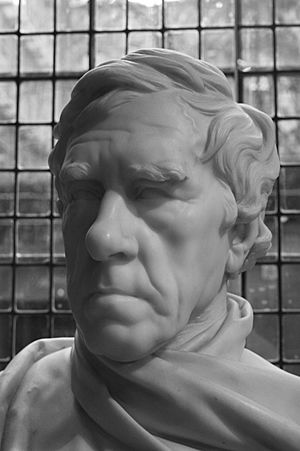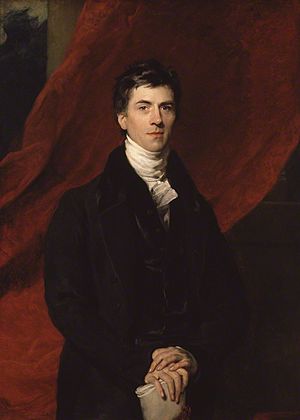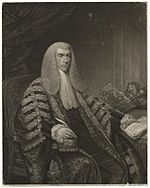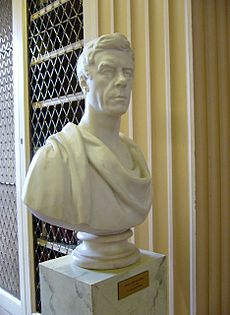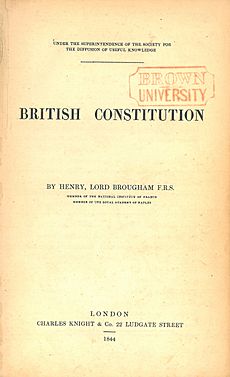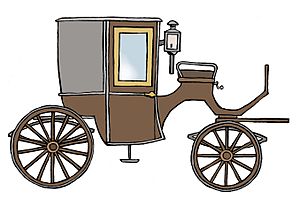Henry Brougham, 1st Baron Brougham and Vaux facts for kids
Quick facts for kids
The Lord Brougham and Vaux
|
|
|---|---|
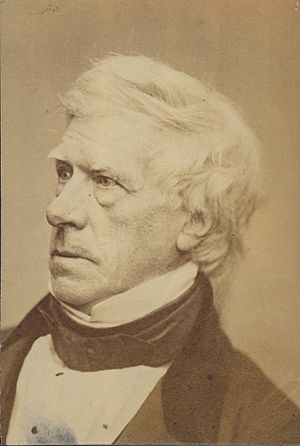 |
|
| Lord High Chancellor of Great Britain | |
| In office 22 November 1830 – 9 July 1834 |
|
| Monarch | William IV |
| Prime Minister | Earl Grey |
| Preceded by | Lord Lyndhurst |
| Succeeded by | Lord Lyndhurst |
| Member of the House of Lords Lord Temporal |
|
| In office 22 November 1830 – 7 May 1868 Hereditary peerage |
|
| Preceded by | Peerage created |
| Succeeded by | The 2nd Lord Brougham and Vaux |
| Member of Parliament for Knaresborough |
|
| In office February 1830 – August 1830 |
|
| Preceded by | George Tierney |
| Succeeded by | Henry Cavendish |
| Member of Parliament for Winchelsea |
|
| In office 1815 – February 1830 |
|
| Preceded by | William Vane |
| Succeeded by | John Williams |
| Member of Parliament for Camelford |
|
| In office 1810 – November 1812 |
|
| Preceded by | Lord Henry Petty |
| Succeeded by | Samuel Scott |
| Personal details | |
| Born | 19 September 1778 Cowgate, Edinburgh |
| Died | 7 May 1868 (aged 89) Cannes, Second French Empire |
| Nationality | British |
| Political party | Whig |
| Spouses | Mary Anne Eden (1785–1865) |
| Children | 2 |
| Parents | Henry Brougham Eleanora Syme |
| Alma mater | University of Edinburgh |
Henry Peter Brougham, 1st Baron Brougham and Vaux (born September 19, 1778 – died May 7, 1868) was an important British statesman. He became the Lord Chancellor, a very high legal position. He played a big part in creating two major laws: the 1832 Reform Act and the 1833 Slavery Abolition Act.
Brougham was born in Edinburgh, Scotland. In 1802, he helped start the Edinburgh Review, a famous magazine. Later, he moved to London and became a barrister (a type of lawyer) in 1808. He was elected to the House of Commons in 1810 as a Whig politician. He represented different areas until he became a peer (a member of the House of Lords) in 1830.
He became very popular for helping to stop the 1820 Pains and Penalties Bill. This bill was an attempt by King George IV to divorce his wife, Caroline of Brunswick. Brougham supported many liberal ideas, like ending the slave trade, promoting free trade, and reforming Parliament.
When he became Lord Chancellor in 1830, he made changes to speed up legal cases. He also helped create the Central Criminal Court. After 1834, he did not hold a government job again. However, he remained active in the House of Lords, often disagreeing with his former friends.
Brougham was also very interested in education. He helped create the Society for the Diffusion of Useful Knowledge and University College London. He also held academic jobs, like Rector at the University of Edinburgh. In his later years, he spent a lot of time in Cannes, France. He helped make Cannes a popular holiday spot for wealthy British people. He died there in 1868.
Contents
Henry Brougham's Early Life and Career
Growing Up in Edinburgh
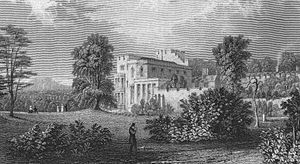
Henry Brougham was born and grew up in Edinburgh, Scotland. He was the oldest son of Henry Brougham and Eleanora Syme. His family, the Broughams, had been important in Cumberland for many years.
He went to the Royal High School and the University of Edinburgh. There, he mainly studied science and mathematics, but also law. He wrote several science papers for the Royal Society. He was even elected a Fellow of the Royal Society at just 25 years old.
Becoming a Lawyer and Writer
Brougham decided to become a lawyer. He became a lawyer in Scotland in 1800, but he did not practice there much. Instead, he moved to London in 1803 and became a barrister in 1808. He was not rich, so he wrote for newspapers and magazines to earn money.
He was one of the people who started the Edinburgh Review. He quickly became known as its most important writer. He wrote articles on many different topics, from science and politics to literature and art.
Early Political Steps
Because of his success with the Edinburgh Review, Brougham was well-known when he arrived in London. He quickly became friends with important Whig politicians, like Lord Grey. In 1806, he worked as a secretary for a diplomatic mission to Portugal. This mission aimed to stop a possible French invasion.
During these years, Brougham strongly supported the movement to end slavery. This was a cause he cared deeply about for his whole life. Even though he was famous, he had to wait to get a seat in Parliament. In 1810, he was elected for Camelford.
He quickly became known in the House of Commons. He spoke very often and some people thought he might become the leader of the Whig Party. However, his career faced a setback in 1812 when he lost an election in Liverpool. He did not return to Parliament until 1816, when he was elected for Winchelsea.
He quickly became one of the most powerful members of the House of Commons again. He worked hard to create a plan for educating poor people. He also supported legal reform. In 1828, he gave a six-hour speech on legal reform, which was the longest speech ever given in the House of Commons.
Defending Queen Caroline
In 1812, Brougham became a main adviser to Queen Caroline of Brunswick. She was the wife of George, Prince of Wales, who later became King George IV. This was a very important event in Brougham's life.
In April 1820, Queen Caroline, who was living abroad, made Brougham her Attorney-General. King George IV wanted to divorce her. Caroline came back to Britain in June. The King immediately started divorce proceedings against her.
Brougham led a team of lawyers who strongly defended the Queen. He was known for fighting very hard for his clients. The King's attempt to divorce Caroline was very unpopular with the public. The bill to divorce her passed by only a few votes. Because of public opinion, the bill was then withdrawn. This outcome made Brougham one of the most famous people in Britain.
Becoming Lord Chancellor
| NO SLAVERY!
ELECTORS OF THE COUNTY OF YORK You honourably distinguished yourselves In the ABOLITION OF THE SLAVE TRADE by your zealous support of WILLIAM WILBERFORCE Who can be more worthy of your choice as a REPRESENTATIVE FOR THE COUNTY the enlightened friend and champion of Negro Freedom HENRY BROUGHAM by returning him YOU WILL DO AN HONOUR TO THE COUNTY and A SERVICE TO HUMANITY |
Brougham remained a Member of Parliament for Winchelsea until February 1830. Then he was elected for Knaresborough. He only represented Knaresborough for a short time. In August of the same year, he became one of four representatives for Yorkshire.
His strong support for ending slavery immediately brought him a lot of support in the industrial West Riding. People created posters asking voters to support Brougham because he was against slavery.
In November, the Tory government, led by the Duke of Wellington, fell. The Whigs, led by Lord Grey, came to power. Brougham joined the government as Lord Chancellor. This is a very important legal position. On November 22, he was given the title Baron Brougham and Vaux. This meant he became a member of the House of Lords.
During his time in government, Brougham helped pass two very important laws. These were the 1832 Reform Act and the 1833 Slavery Abolition Act. The Reform Act changed how people voted and gave more people the right to vote. The Slavery Abolition Act ended slavery in most of the British Empire.
However, some people thought Brougham was difficult to work with. He was seen as dangerous and arrogant. He lost his government job in 1834. Even though Lord Melbourne became Prime Minister again in 1835, Brougham was not included in the new government.
Later Life and Legacy
Brougham never held a government job again. But for more than thirty years, he remained active in the House of Lords. He continued to work for different kinds of reforms. He also spent a lot of his time writing. He kept writing for the Edinburgh Review. His best writings were later published as Historical Sketches of Statesmen Who Flourished in the Time of George III.
In 1837, Brougham suggested a bill for public education. He believed that Britain needed to do more to educate its people. He also helped found the National Association for the Promotion of Social Science in 1857.
In 1860, Queen Victoria gave Brougham a second peerage. This was to honor his great work, especially in helping to end slavery. This new title could be passed on to his younger brother, William Brougham.
Family Life
Brougham married Mary Spalding in 1821. She was the widow of John Spalding. They had two daughters, but sadly, both of them died before their parents. Lord Brougham and Vaux died in May 1868 in Cannes, France, at 89 years old. He was buried in the Cimetière du Grand Jas cemetery.
His statue stands in the cemetery, and he is remembered for his big role in building the city of Cannes. The first title he received became extinct when he died because he had no sons to inherit it. His second title was passed on to his younger brother, William Brougham.
Impact on Cannes
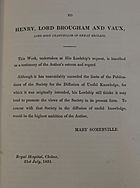
Henry Brougham is also known for designing the brougham, a type of horse-drawn carriage named after him. He also made the French town of Cannes famous. In 1835, Cannes was just a small fishing village. Brougham bought land there and built a house. This made Cannes a popular place for wealthy British people to visit, especially in winter.
Because of his influence, the beachfront walkway in Nice became known as the Promenade des Anglais (which means "The Promenade of the English"). Brougham encouraged others to visit Cannes and buy second homes there. He even oversaw the building of 'Villa Elenore-Louise', named after his daughter. A statue of Lord Brougham stands on the Cannes waterfront today.
Other Achievements
Brougham holds the record for the longest non-stop speech in the House of Commons, which lasted six hours. He was also present at the first trial of a steam-powered ship in Scotland in 1788. Brougham Street and Brougham Place in Edinburgh are named in his honor.
Works
Brougham wrote many books and papers on science, philosophy, and history. Some of his famous works include Dialogues on Instinct and Lives of Statesmen, Philosophers, and Men of Science of the Time of George III. He also wrote an autobiography when he was 84 years old, which was published after his death.
Images for kids
See also
 | Janet Taylor Pickett |
 | Synthia Saint James |
 | Howardena Pindell |
 | Faith Ringgold |


